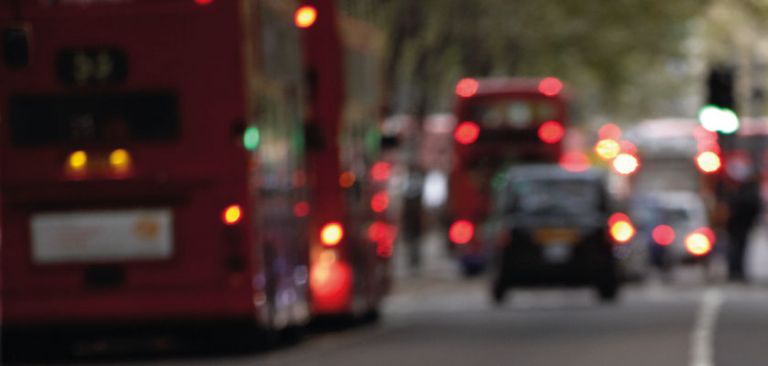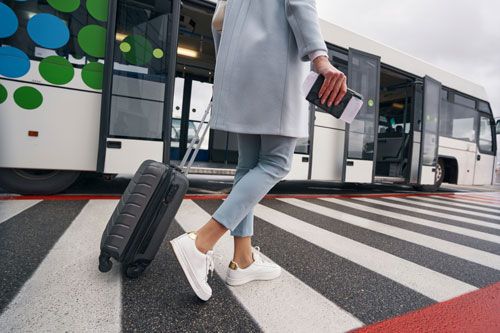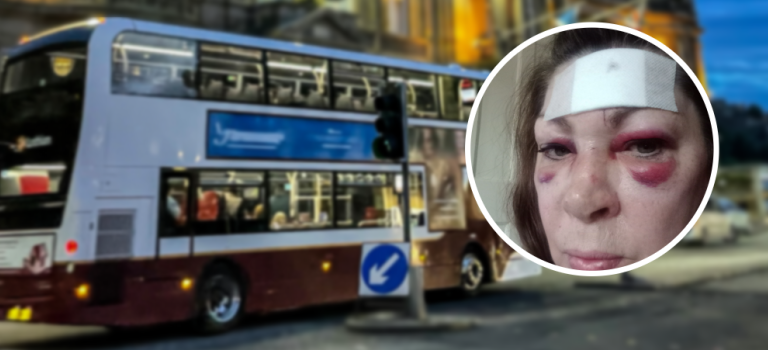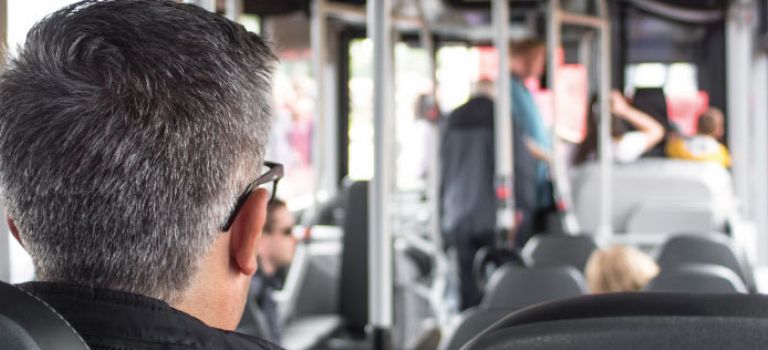Public transport accident claims in Scotland
Whether you are on a bus, taxi, train, ferry or plane, it is the duty of those in control of these modes of transport to ensure your safety. Whether it was the fault of the vehicle you were in or the result of someone else’s negligence, it is important to remember that you have rights.
If you are injured, then you can seek compensation for your loss, whether you have sustained minor or serious injuries, including the loss of life of a family member.
Many of us never think we may be involved in a road accident when using public transport but unfortunately, it’s a frequent occurrence. If it happens to you, then where can you go to seek help? Many people immediately turn to the operator of the transport business to seek redress, but we know from experience that you need independent legal advice.
Digby Brown has relevant experience across the whole of Scotland and beyond, having helped thousands of people over many years. Some of the incidents have been in the news where significant loss of life has occurred and others are more straightforward, such as when a taxi has been hit by another vehicle. We have the experience and expertise to help.
The public transport injury claim process
Public transport claims can be complicated because they often relate to the negligence of another driver. It doesn’t matter how it happened - all that matters is that the law says you’re entitled to compensation if you suffered an injury because someone else was negligent.
Your solicitor will investigate all the circumstances of your case including:
- The extent of your injuries
- The need for specialist medical treatment
- The need for any ongoing care or support
- Your loss of earnings
- Any additional expenses caused by the accident
By working with medical and financial experts to analyse all these different points, we can then work out how much compensation we believe will be fair. This is to make sure your case settles for its proper value rather than simply accepting what an insurance company thinks is fair (which is often incorrect).
We also gather all the evidence other organisations might have on the incident such as reports from the police or the Health and Safety Executive in support of your claim.
Examples of some evidence that help progress a claim are:
Proof of the journey – keep any related documents such as tickets, receipts, or booking confirmations as proof of the journey whether that be a train ticket, or a receipt from a taxi.
Witness details – if it is safe to do so, ask for contact details from any witnesses who saw the accident. If you were in a bus or taxi accident, ask other drivers for dash cam footage. If you were involved in an accident on a plane, train, or ferry, speak to other passengers and see if anyone was filming on their phone at the time of the accident.
Incident reported – ensure that the incident has been reported to the appropriate authorities and ask for a copy of the police report.
Details of injuries and medical attention – keep notes of the GP you spoke to or the time you went to A&E so that these can be tracked easily. It can also be helpful to provide information about the hospital you attended, details of the person who brought you in or what ward you were kept in.
Once you are involved in any kind of accident, we must gather as much evidence as possible. The more evidence we can gather, the better.
No win, no fee personal injury solicitors
The expression “No win, no fee” is often used in personal injury cases. It is used as a way of funding a compensation claim where the accident victim does not have the means to pay for the costs involved as the case progresses.
A number of solicitors are prepared to handle personal injury cases on a “No Win – No Fee” basis but very few are able to offer their clients complete protection if the case is unsuccessful.
In that event, the client could end up being liable for many thousands of pounds in legal expenses or the case won't be fully investigated and therefore likely to under-settle.
Compensate 'no win, no fee' funding
Digby Brown has its own funding company, Compensate, which provides the funding to allow the case to be fully investigated, employ the best experts surrounding the circumstances of the accident and/or injuries sustained and where and if necessary go to court.
If for whatever reason the case is unsuccessful, Compensate pays all your legal expenses and those of your opponent – you pay nothing.
On average our clients receive over 3 times the pre-litigation offer
Because of Compensate funding Digby Brown's success rate is extremely high and on average our clients receive three times the pre-litigation offer.
In the event the case is successful, a small percentage of your damages will be deducted with VAT to pay for this service. The percentage which Compensate will charge depends on the degree of risk involved. We believe that this is the fairest method of giving clients access to justice whilst ensuring their cases are fully investigated, prepared and funded.
Don’t take our word for it, just read many of the court decisions and case studies on our website.
Beware of compensation offers which may be too good
We know you will have seen many adverts offering 100% compensation or telling you that you will not lose any of your compensation, however we believe there are a number of problems with companies that do this.
- How do they make their money if they don’t charge you anything?
- If they aren’t taking any money from you, the client, what incentive do they have to ensure you receive the right level of compensation, appropriate to the injuries you have sustained?
- Fully preparing a case, finding out exactly what happened and what the consequences of your injuries may mean in the long term, is expensive, how do they do this properly?
- If they aren’t fully preparing these cases will they just accept the first offer they are given on your behalf by the Insurance company?
- It makes simple business sense, the less work they do the higher their profit margin is - they simply have no incentive to work harder on your behalf.
- These adverts in the main are from English firms on national television which operates in a different way and therefore wouldn’t apply to a Scottish person.
We know from the many client cases we mandate from other firms of solicitors (in the main at the request of the client who is extremely unsatisfied with the service received for the other firm) that many shortcuts are taken in preparation and that the first offer received is being recommended for acceptance, regardless of the value.
Getting something for nothing is usually the first sign of poor service.
Correct level of compensation with Digby Brown
Our experience and statistics show time and time again we will achieve the correct level of compensation which will be substantially more than the insurer is initially prepared to offer.
Even after we have deducted our percentage as a success fee you will gain considerably more than you would have achieved using a 100% compensation model.
Contact Digby Brown's personal injury solicitors
We have offices across Scotland in Glasgow, Edinburgh, Dundee, Kirkcaldy, Inverness, Aberdeen and Ayr.
For further information about no win, no fee, or anything else, call us on 0333 200 5925 or fill in our enquiry form below and someone will get back in touch with you.
Common causes of public transport accidents
No one sets out to cause a crash or injure the passengers they are transporting and most of the causes of these incidents are due to failures by others on the roads but other factors do come into play:
Adverse weather - all transport providers have a duty of care for passengers. We have witnessed numerous bus accidents where the operator should not have set out due to the road conditions. Ferry operators, for example, need to pay attention to the wind speed and sea swells. If they decide to set off in spite of these known risks, then they may be negligent.
Human error – sometimes the driver of a vehicle may fail to meet the standards expected of them. For example, if a taxi driver takes their eye off the road, this may result in a collision.
Poor systems of work – train operators may find themselves liable if, for example, they continue to let passengers continue to board a crowded train carriage.
Defective equipment – imagine that a company has not carried out routine (but vital) maintenance to its buses and this has resulted in a mechanical failure that resulted in a crash. This would arguably make them negligent and liable for any compensation owed to you.
All these factors play a part in investigating your public transport claim and accessing justice.
The above holds true if you suffered a serious trauma – like a head or spinal cord injury – or if your accident happened abroad. Digby Brown has the right specialists to help no matter what the circumstances are and no matter how you were injured.
Free legal advice about public transport claims
If you have been injured in an accident when using public transport, we would encourage you to get in touch for legal advice about where you stand and if you can make a claim.
Call us to speak to a legal advisor or fill in our online enquiry form and a legal advisor will call you back.
0333 200 5926
Monday to Friday: 8am - 7pm
Saturday and Sunday: 12pm - 4pm
(Please note, local rate, even from mobile)
Email enquiry form
Complete our enquiry form and we will strive to reply within 24 hours
Follow us

-
based on 3,257 reviewsShowing our 4 and 5 star reviews.




